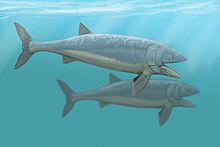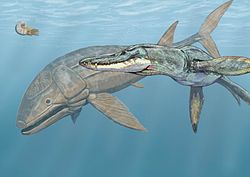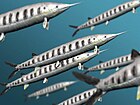利兹鱼
| 困惑利兹鱼 | |
|---|---|

| |
| 现代人从利兹鱼化石推想出来的想像图 | |
| 科学分类 | |
| 界: | 动物界 Animalia |
| 门: | 脊索动物门 Chordata |
| 纲: | 辐鳍鱼纲 Actinopteri |
| 目: | †厚茎鱼目 Pachycormiformes |
| 科: | †厚茎鱼科 Pachycormidae |
| 属: | †利兹鱼属 Leedsichthys |
| 种: | †困惑利兹鱼 L. problematicus
|
| 二名法 | |
| †Leedsichthys problematicus Woodward, 1889
| |
困惑利兹鱼(学名:Leedsichthys problematicus)是利兹鱼属(学名:Leedsichthys),又称利兹鲲属,的唯一物种及模式种;而这个属是一种已经灭绝的巨大中生代辐鳍鱼厚茎鱼目的成员[1],生活在1亿6500万至1亿5200万年前的侏罗纪中晚期的海洋[2],直到白垩纪结束。牠们代表了真骨类的一个早期分支。
本物种首个被发现的遗骸在19世纪时被认出,被认为是有史以来最巨大的硬骨鱼类。在现存鱼类中与利兹鱼最接近的是弓鳍鱼,虽然这两种鱼类之间的关系仍然距离很远。利兹鱼的名称意为“利兹的鱼”,因化石收集家Alfred Nicholson Leeds于1889年在英格兰彼得伯勒发现它的化石而得名[2]。 利兹鱼的化石可以在英格兰的卡洛夫阶、德国及法国北部、智利的牛津阶及法国的启莫里阶等地发现[3]。1999年,在智利的一次发现,学者一度以为发现了本属的第二个物种,被曾将之命名为Leedsichthys notocetes,但事后发现这个“新物种”的遗骸无法与原有的遗骸分辨,所以认为这次发现的其实亦是原来的物种。
本属物种的化石非常难以辨认及描述,因为牠们的化石非常破碎:其遗骸中有不少部分由软骨组成,而这些软骨均无法成为化石;而亦有多次这些碎片被错误辨认为剑龙亚目的恐龙遗骸。因此,利兹在发现它的化石后,以problematicus作为利兹鱼的种小名[2]。
体型
[编辑]
虽然古生物学家已经发现几具利兹鱼的化石,但是完整的脊椎骨化石尚未发现[2],所以古生物学家很难确定牠的大小,亚瑟·史密斯·伍德沃德(Arthur Smith Woodward)在1889年描述利兹鱼的标本,并拿牠的尾部与高茎鱼属比较后,估计它的长度大约是9米(30英尺)。古生物学家D. M. Martill在1986年拿他刚发现的利兹鱼化石[4]与其他厚茎鱼类互相比较,不过因为这具样本相当不寻常[3],所以利兹鱼推断出来的体型大小范围相当广。最近古生物学家根据历史上所发现的化石[5],及古生物学家在靠近彼得伯勒惠特西(Whittlesey)[6][7]所发现更完整的样本来估计的结果都支持亚瑟史密斯伍德沃德当时所估计的结果-9至10米(30至33英尺)。近来古生物学家使用树轮年代学来研究利兹鱼的骨骸,结果显示牠们要长到这个长度需要花费21至25年[8]。而根据其他样本进行的研究显示利兹鱼最大可以长到超过16米[9](53英尺),从而推算出这种鱼比现时的鲸鲨还要重的结论[10],是不合理的推论。
保存在伦敦英国自然历史博物馆的P.6924样本显示,利兹鱼遭受上龙亚目的滑齿龙攻击。这些伤口后来愈合了,这显示利兹鱼可以躲避牛津黏土组(Oxford Clay)中的侏罗纪掠食者,很可能是因为牠们具有强大的尾巴。
古生物学
[编辑]就如同现存体型最大的鱼类鲸鲨与姥鲨,利兹鱼也属于滤食性动物,牠们主要透过鳃笼内特化的鳃耙过滤出海水中的浮游动物及其他小型动物为食,然而利兹鱼是否也会以浮游植物与藻类为食目前仍不确定。利兹鱼很可能是于游泳时被动让海水流过鳃耙来过滤出食物,但也可能具有搧动鳃笼主动汲取海水过滤的能力。2010年,利斯顿的研究推测,原先于瑞士所发现可能是因蛇颈龙摄食行为所形成的海床沟纹生痕化石,其实是由利兹鱼的摄食行为所导致。利兹鱼很可能会透过对海床喷水来搅动泥沙,借此翻找并过滤埋藏于沉积物内的底栖生物[11]。
目前对于利兹鱼的生命史仍未明了,1993年针对牠们骨架结构的研究认为牠们具有较高的新陈代谢[12],2013年利斯顿的研究则认为利兹鱼具有较缓慢、接近线性的成长速度[13]。另外由于真骨类多半仅会产下较小的卵,科学家仍不清楚利兹鱼为何得以成长到如此巨大的体型[14]。
1986年,马蒂尔在利兹鱼的骨头上发现了一枚嵌入的中喙鳄属牙齿化石。由于骨头似乎有愈伤再生的迹象,他认为体长约3米(9.8英尺)的中喙鳄会主动去狩猎利兹鱼[15]。然而于2007年,利斯顿研究的结论认为该骨头化石上并非再愈合的痕迹,中喙鳄仅是去啃食利兹鱼的尸体。一具体长2.5米(8英尺2英寸)的傲慢中喙鳄化石样本(编号FBS 2012.4.67.80),在其胃中曾经发现了利兹鱼的鳃耙碎片及无脊椎动物的遗骸,这意味着中喙鳄具有十分多样化的食性,也不排除食腐[16]。在当时,于牛津泥层有足够体型能猎捕利兹鱼的顶级掠食者为上龙科的滑齿龙属。
1999年,马蒂尔认为卡洛夫期晚期的气候变迁导致了生存于北部的利兹鱼族群灭绝,而生存于南部的利兹鱼则撑到了牛津期[17]。然而,于2010年,由于诺曼地利兹鱼化石的出土,利斯顿认为牠们于启莫里期仍生存于北方的海域,而这推翻了之前马蒂尔的研究[11]。此外,于2007年,利斯顿指出在中生代卡洛夫期之前缺乏体型大于0.5米(1.6英尺)的滤食性动物可能是因为浮游动物的缺乏,在这之后由于浮游动物数量的增加才导致如利兹鱼等大型滤食者的发生。而在利兹鱼之后,一直到白垩纪晚期,海洋中都持续存在着体型大于2米(6.6英尺)的滤食性厚茎鱼目物种,包括邦鱼属以及长身鱼属[18],与现存的须鲸具有明显的趋同演化[19]。
近年一项针对利兹鱼代谢速率与游速的研究,透过与现存的真骨类鱼类做比较后,科学家发现在维持组织不缺氧的前提下,利兹鱼巡游的速度可达11 mph(17.8 km/h)[10][20]。
大众文化
[编辑]
利兹鱼出现于2003年英国BBC制作的《海底霸王》里,一只利兹鱼被地蜥鳄、弓鲛猎杀,最后被一只滑齿龙杀死,成了一群滑齿龙的大餐。
注释
[编辑]- ^ 体长超16米的史前巨鱼——利兹. 亚太日报. 2013-08-26 [2013-08-26]. (原始内容存档于2014-01-18).
- ^ 2.0 2.1 2.2 2.3 Liston, 2004
- ^ 3.0 3.1 Liston, 2008a
- ^ Martill, 1986
- ^ Liston & Noè, 2004
- ^ Sloan, 2004
- ^ Liston, 2006
- ^ Liston, Steel & Challands, 2005
- ^ Liston, 2005
- ^ 10.0 10.1 Barras, Colin. This ancient fish was bigger than a whale shark—and faster than scientists ever imagined. 科学 (学术期刊). 2018-05-29 [2018-06-02]. doi:10.1126/science.aau3243. (原始内容存档于2019-12-06) (英语).
- ^ 11.0 11.1 Liston, J.J., 2010, "The occurrence of the Middle Jurassic pachycormid fish Leedsichthys", Oryctos 9: 1-36
- ^ Bardet, N., Pennettier, E., Pennetier, G., Charles, A. & Charles, J., 1993, "Des os énigmatiques à section triangulaire dans le Jurassique Moyen (Callovien) de Normandie", Bulletin trimestriel de la Société géologique de Normandie et des amis du Muséum du Havre 80: 7-10
- ^ Liston, J., Newbrey, M., Challands, T., and Adams, C., 2013. Growth, age and size of the Jurassic pachycormid Leedsichthys problematicus (Osteichthyes: Actinopterygii) (PDF). Arratia, G., Schultze, H. and Wilson, M. (编). Mesozoic Fishes 5 – Global Diversity and Evolution. München, Germany: Verlag Dr. Friedrich Pfeil. 2013: 145–175 [2024-03-18]. ISBN 9783899371598. (原始内容存档 (PDF)于2023-08-18).
- ^ Freedman, J.A. & Noakes, L.G., 2002, "Why are there no really big bony fishes? A point-of-view on maximum body size in teleosts and elasmobranchs", Reviews in Fish Biology and Fisheries 12: 403-416
- ^ Martill, D.M., 1986, "The diet of Metriorhynchus, a Mesozoic marine crocodile", Neues Jahrbuch fur Geologie und Paläontologie, Monatshefte 1986: 621-625
- ^ Stéphane Hua, Jeff Liston, Jérôme Tabouelle. The Diet of Metriorhynchus (Thalattosuchia, Metriorhynchidae): Additional Discoveries and Paleoecological Implications. Fossils. February 2024, 2 (1): 66-76. doi:10.3390/fossils2010002
 .
.
- ^ Martill, D.M., Frey, E., Caceras, R.P. & Diaz, G.C., 1999, "The giant pachycormid Leedsichthys (Actinopterygii) in the southern hemisphere: further evidence for a Jurassic Atlanto-Pacific marine faunal province", Neues Jahrbuch für Geologie und Paläontologie, Monatshefte 1999: 243-256
- ^ Friedman, M., K. Shimada, L.D. Martin, M.J. Everhart, J. Liston, A. Maltese and M. Triebold, 2010, "100-million-year dynasty of giant planktivorous bony fishes in the Mesozoic seas", Science 327: 990–993
- ^ Friedman, M., 2011, "Parallel evolutionary trajectories underlie the origin of giant suspension-feeding whales and bony fishes", Proceedings of the Royal Society B, 279: 944-951
- ^ Humberto G. Ferrón, Borja Holgado, Jeffrey J. Liston, Carlos Martínez‐Pérez & Héctor Botella, 2018, "Assessing metabolic constraints on the maximum body size of actinopterygians: locomotion energetics of Leedsichthys problematicus (Actinopterygii, Pachycormiformes)", Palaeontology 61(5): 775-783
参考资料
[编辑]- "Biggest Fish Ever Found" Unearthed in U.K.(页面存档备份,存于互联网档案馆) National Geographic News. Published October 1, 2003.
- World's Largest Fish Fossil Found in England(页面存档备份,存于互联网档案馆). National Geographic News. Published October 3, 2003.
- [1]. Most comprehensive overview of Leedsichthys, see further references within for further details.
- Haines, Tim & Chambers, Paul. (2006). The Complete Guide to Prehistoric Life. Canada: Firefly Books Ltd.
- Liston, JJ (2004). An overview of the pachycormiform Leedsichthys. In: Arratia G and Tintori A (eds) Mesozoic Fishes 3 - Systematics, Paleoenvironments and Biodiversity. Verlag Dr. Friedrich Pfeil, München, pp 379–390.
- Liston, JJ (2008a). Leedsichthys des Vaches Noires au peigne fin (translation by M-C Buchy) L’Écho des Falaises (=Ech.des Fal.) No.12: 41-49, 2008 ISSN 1253-6946.
- Liston, JJ (2008b). A review of the characters of the edentulous pachycormiforms Leedsichthys, Asthenocormus and Martillichthys nov. gen. In: Mesozoic Fishes 4 Homology and Phylogeny, G. Arratia, H.-P. Schultze & M. V. H. Wilson (eds.): pp. 181–198, 10 figs., 1 tab. © 2008 by Verlag Dr. Friedrich Pfeil, München, Germany – ISBN 978-3-89937-080-5.
- Liston, JJ & Noè, LF (2004). The tail of the Jurassic fish Leedsichthys problematicus (Osteichthyes: Actinopterygii) collected by Alfred Nicholson Leeds - an example of the importance of historical records in palaeontology. Archives of Natural History 31: 236-252.
- Sloan, C (2004). Big Fish Story. National Geographic Magazine, p.42. 1/9/2004.
- Liston, JJ (2006). From Glasgow to the Star Pit and Stuttgart: A short journey around the world's longest fish. The Glasgow Naturalist 24: 59-71.
- Liston, JJ, Steel, L & Challands, TJ (2005). Lured by the Rings: Growth structures in Leedsichthys. In: Poyato-Ariza FJ (ed) Fourth International Meeting on Mesozoic Fishes - Systematics, Homology and Nomenclature, Extended Abstracts. Servicio de Publicaciones de la Universidad Autónoma de Madrid/UAM Ediciones, Madrid, pp 147–149.
- Liston, JJ (2005). Homologies amongst the fragments: searching for synapomorphies in shattered skulls. In: Poyato-Ariza FJ (ed) Fourth International Meeting on Mesozoic Fishes - Systematics, Homology and Nomenclature, Extended Abstracts. Servicio de Publicaciones de la Universidad Autónoma de Madrid/UAM Ediciones, Madrid, pp 141–145.
- Smith Woodward, A (1889). Preliminary notes on some new and little-known British Jurassic fishes. Geological Magazine Decade 3 Volume 6: 448-455.
- Smith Woodward, A (1905). A Guide to the Fossil Reptiles, Amphibians, and Fishes in the Department of Geology and Palaeontology of the British Museum (Natural History). Eighth edition. British Museum (Natural History), London. Pp xviii, 110 pages.
- Martill, DM (1986). The world's largest fish. Geology Today March-April: 61-63.
外部链接
[编辑]- For more on the Star Pit dig of 2002-2003 look here (页面存档备份,存于互联网档案馆)
- the BBC-Open University series Fossil Detectives. (页面存档备份,存于互联网档案馆)
- For a more accurate reconstruction of Leedsichthys visit Paleocreations.(页面存档备份,存于互联网档案馆)
- The profile of Leedsichthys problematicus from the BBC series Sea Monsters (页面存档备份,存于互联网档案馆)
- "Biggest Fish Ever Found" Unearthed in U.K.(页面存档备份,存于互联网档案馆) 国家地理新闻,于2003年10月1日发布
- An article on the latest discovery of a Leedsichthys problematicus fossil(页面存档备份,存于互联网档案馆)估计72英尺(22米)长
- A picture of Leedsichthys problematicus (页面存档备份,存于互联网档案馆)
- An article on Leedsichthys from Darren Nash







